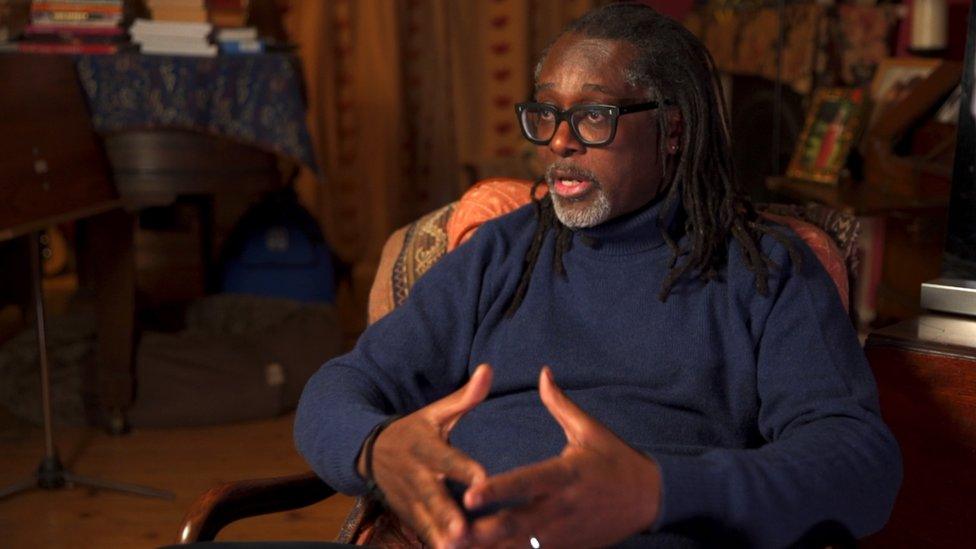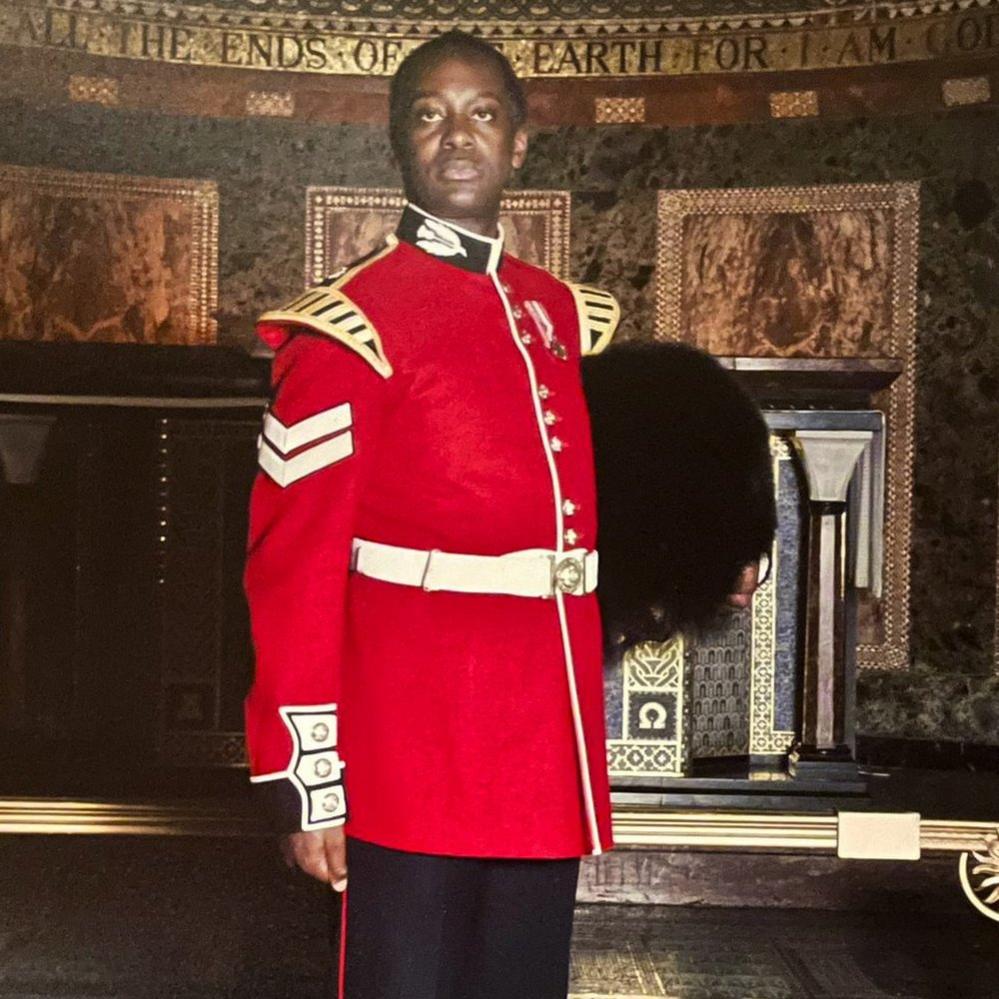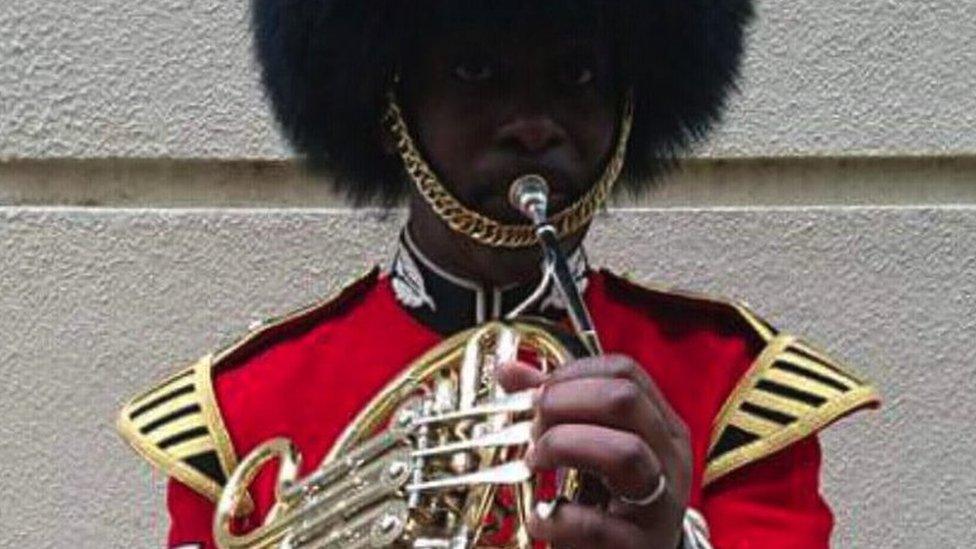Rastafarian soldier wins racism case against Army
- Published

Dwight Pile-Gray had a 16-year Army career before the incident
One of the British Army's first Rastafarian guardsmen has won a claim of race discrimination and harassment against the Ministry of Defence.
Dwight Pile-Gray says his 16-year Army career was brought to an end following a row at a guardroom, in which a white guard didn't believe he was a soldier.
When he challenged the soldier, he was accused of "playing the race card". He won his case at an employment tribunal.
The MoD said it did not tolerate abuse, bullying or discrimination of any kind.
Speaking publicly about the incident for the first time, he told BBC News he believes his case shows it is worse to accuse someone of being racist in the Army, than it is to actually be racist.
The employment hearing was held in June, and Mr Pile-Gray found out he had won the case in October.
'Full of optimism'
Dwight Pile-Gray says he always knew he'd stand out in the Army.
He was the first Rastafarian soldier to be allowed to wear his hair in locks. He also joined later in life than most, at the age of 37.
He signed up in 2005, as an accomplished musician with the Royal Corps of Army Music. He played the French horn in various military bands, eventually taking up a role in the Band of the Grenadier Guards.

Dwight Pile-Gray joined the Army later in life than most - aged 37.
Mr Pile-Gray took part in dozens of state occasions, tying up his hair to fit into his bearskin. "I was under no illusion as to what I might encounter," he says of joining the Army. "But I was full of optimism."
He says there were always questions about his appearance from other guards: "Why are you allowed to wear your hair like that? Aren't you supposed to be a pacifist? Don't you smoke drugs?"
Mr Pile-Gray says he put such comments down to "ignorance". But he says there was worse. Soldiers used racially offensive words, he says, including the N-word, while in his presence. Some asked derogatory and racist questions, including about the size of his genitals.
Mr Pile-Gray says such ignorance didn't stop him enjoying his job, or rising in the ranks. He became a lance sergeant.
But in July 2021, at Wellington Barracks, in central London, he had a row with two white soldiers at the guardroom to his base.
Mr Pile-Gray had already been into the barracks for a medical appointment, but he'd gone out to make a phone call. He'd mistakenly left his ID card behind.
He was wearing civilian clothes and sunglasses and he had his locks on display.
'Completely flabbergasted'
When he returned, he says the lance corporal on duty, who was white, was "disbelieving that I could be a soldier - he actually stuck his head back into the guard room and said 'this gentleman thinks he's left his ID inside'".
"I was absolutely treated differently because of my appearance," he adds. "I've been doing this a long time and I understand when there is a racial element to an interaction."
Mr Pile-Gray says he challenged the soldier, who was more junior than him, and he was allowed back in after someone else recognised him.
He says he got changed into his uniform and returned to prove to the lance corporal that he was a soldier and to make it clear he could have handled the situation better.
In the ensuing conversation, the lance corporal accused him "of playing the race card", at which point a more senior soldier, a white sergeant, got involved.
Mr Pile-Gray says the sergeant told him, "if I was going to make it into a race thing, then he wasn't interested". He says the sergeant then told him to "look at my office", pointing out that it was multicultural, before adding: "We can't be racist."
He says the interaction left him "completely flabbergasted". Mr Pile-Gray admits he then lost his temper and describes being bundled out of the guardroom.
He then went to see an officer to explain what had happened and was asked whether he wanted to make a complaint. Mr Pile-Gray said he suggested mediation and wanted to explain to those involved why their behaviour was wrong.
"They had no understanding or concept that what they were actually saying was racist," he says.

Mr Pile-Gray was the one left facing disciplinary action
Instead, Mr Pile-Gray was eventually told that he'd be the one facing disciplinary action. Eventually he was given a formal charge of insubordination.
It was "the straw that broke the camel's back", Mr Pile-Gray says."I didn't feel that I could continue in an organisation that so disregarded my feelings and my welfare, and actively sought to make me a bad person."
Mr Pile-Gray made a service complaint, which was eventually rejected. It was only then that he took his case to the employment tribunal, which ruled earlier this year.
His claims of direct race discrimination, racial harassment and victimisation were successful.
The Ministry of Defence won't comment on individual cases. However, in a statement it said it did not tolerate abuse, bullying or discrimination of any kind.
The MoD said it actively encouraged personnel to report unacceptable behaviours and had introduced measures to improve the experience for everyone in the armed forces.
Mr Pile-Gray says it is hard for people higher up the chain of command to understand the issues of racism inside the Army.
He said racial slurs wouldn't be used in the presence of senior black officers. "It doesn't exist at the top," he added. "They're going to be calling you 'sir'. But if you're a black private, guess what? You're going to hear that every single day."
Emma Norton, from the Centre for Military Justice, gave legal support to Mr Pile-Gray.
"Not only did the chain of command fail to act on his concerns about racial bias, it then victimised and gas-lit him for having the temerity to complain about it," she says.
The Army's response fell woefully short, she says, including during the litigation. She added: "It's lost an excellent soldier in the process."